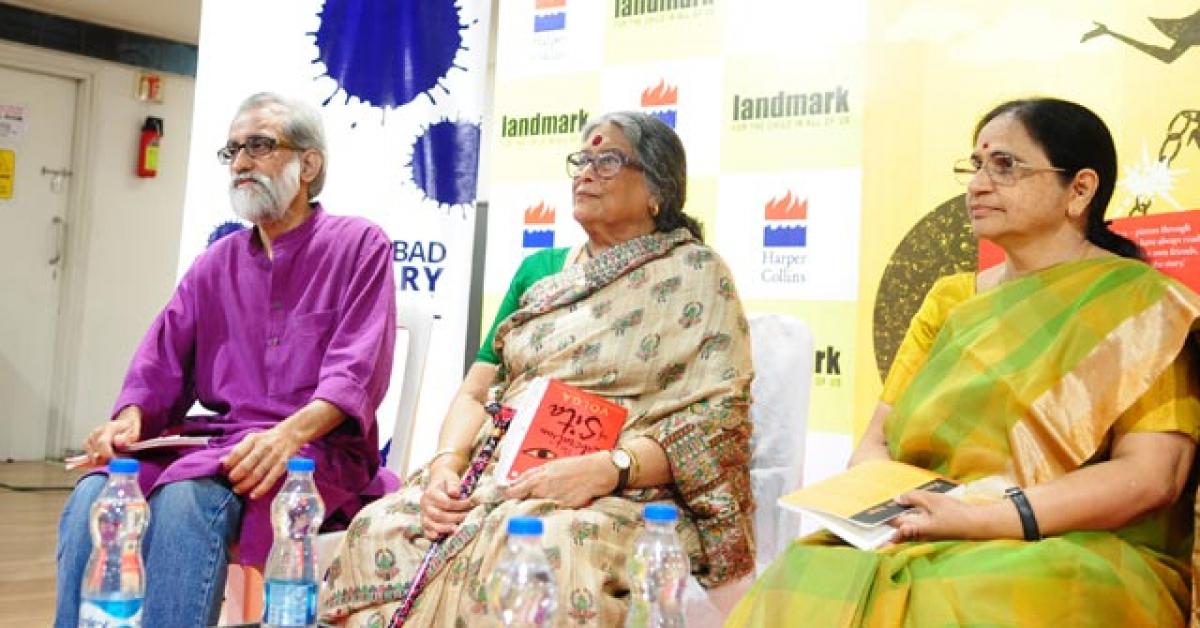Live
- India is 'Mother of Democracy': PM Modi
- ‘One nation, one election’ will undermine India’s federal structure: Mehbooba Mufti
- ‘Bachhala Malli’ trailer heightens anticipation
- Karnataka quota row: Backward Class forum chief warns Lingayat seer over 'tinkering with reservations'
- Tight security arrangements at Group-II examination centers District SP
- Alia Bhatt captures attention in white
- Varun Dhawan talks about ‘Baby John’
- ‘Moonwalk’ trailer promises a quirky heist, love, and loyalty
- Combat leaf spot disease
- Ahsaas Channaopens up about her complex character in ‘Mismatched 3’
Just In

Renowned novelist, children’s writer and poet, Nabaneeta Dev Sen launched the book ‘The Liberation of Sita’ written by Volga at Landmark Book Store over the weekend.
Renowned novelist, children’s writer and poet, Nabaneeta Dev Sen launched the book ‘The Liberation of Sita’ written by Volga at Landmark Book Store over the weekend. This book is the English translation of the Telugu version, ‘Vimuktha’. Published by Harper Collins, it is translated by T Vijay Kumar, Professor for English, Osmania University and Vijayashree.
“I think this is a special book. I’m also working on retelling the story about Goddess Sita from 1980’s. Telugu poet, Atukuri Molla also wrote Ramayanam as like Valmiki. In Bengali, poet Chandravati wrote Bengali Ramayanam, which was completely against the God Rama. We should not forget that the Ramayanam starts with the birth of Sita. Till now six books have been published on the birth of Sita where as there are only two about Rama. The book is not only talking about the sufferings of women but also explains about their anger,” said Nabaneeta.
Speaking about the translated version, Volga said, “The book is about Sita who, after being abandoned by Rama, embarks on an arduous journey to self-realisation. On the way she meets extraordinary women like Surpanaka, Renuka, Urmila and Ahalya who have broken free from all that held them back; husbands and sons.
The book has five stories – The Reunion, Music of the Earth, The Sand Pot, The Liberated and The Shackled.”“This book ‘Vimuktha’ was published in Telugu six years ago. I tried to see the Ramayana from Sita’s point of view. I thought that I may face criticism after writing these stories about the unknown things of Ramayana like how Sita meets Ahalya and Surpanaka but, everybody accepted my stories,” added the author.
“Today Chandravati Ramayanam has become women’s favourite. In Telugu, we see that most of village women singing Rama songs. This book is close to my heart. Today, no one wants to translate others works into English; instead they want to write their own.
Translators Alladi Uma and Sridhar are the shining examples in the Indian literature. Translation is very important in India right now. If we want to know the great literature of other languages then we must translate them into English. This helps to overcome the language barriers,” said Nabaneeta about the significance of translated versions.

© 2024 Hyderabad Media House Limited/The Hans India. All rights reserved. Powered by hocalwire.com







